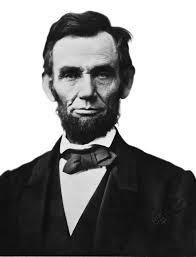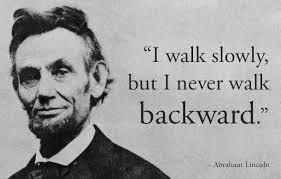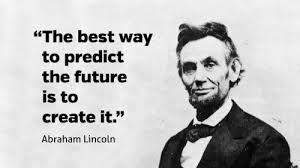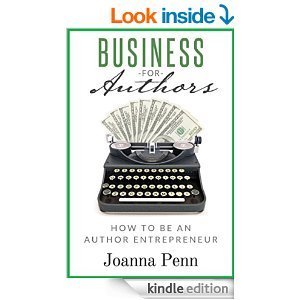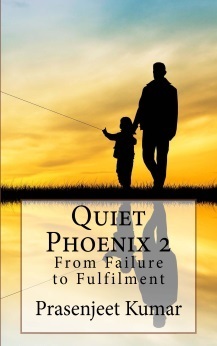Prasenjeet Kumar's Blog, page 5
February 16, 2015
Writing Without Spending a Dime
You may wonder if I’m starting with an oxymoron, because writing normally is NOT an activity that should cost anyone any money. You just grab your pen and paper, if you are an “old world” writer, and start scribbling away. Or if you are like me, you power up your laptop, open a document on your word processor and start punching.
Image Courtesy of Naypong/FreeDigitalPhotos.net
Hopefully you may have some pen and paper or a laptop lying somewhere around your home. So where do you need to spend any money on writing?
Can you guess? It’s training, of course! A lot of advice floats on the internet (mostly coming from other authors) asking budding writers to not even start thinking about their dream novel unless they have put in Malcom Gladwell’s famous 10,000 hours of training.
So what is wrong with this advice? Shouldn’t authors acquire the craftsmanship of writing so that when they write their first work of fiction or non-fiction, they appear reasonably professional to their potential readers?
Surely there can be no harm attempting that, notwithstanding the fact that most famous authors didn’t have any professional training in creative writing (not even J.K. Rowling).
My basic reservation stems from the fact that most such writing workshops are extremely expensive (some even cost anywhere from $4000-$12000). What if you are a poor Author who has lost her day job and can barely afford to pay your mortgage and bills? What if you live in a country (other than in the North America or Europe) where you may not have any access to good training, simply because writing is considered a hobby (or a luxury) and most people like to be coached, if they have to, for getting some other “real” job?
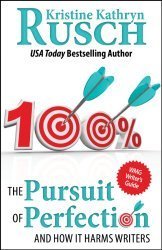

And this is not even the most important part. Ever since I read Kristine Kathryn Rusch’s excellent book “The Pursuit of Perfection and How It Harms Writers” my eyes have been opened about the reality of workshop training. Writers join such workshops in the hope of improving their craft but often quite the opposite happens. Rusch does a fantastic job of exposing how destructive the techniques employed by peer workshops are for a budding writer’s morale and career. By peer workshops, she means, “workshops, in which everyone, from the professor (or editor or writer-leader) to the unpublished students gets to weigh on in the manuscript before them”.
In these workshops what typically happens is that your manuscript (usually a short story) gets to be critiqued (actually the word for this is constructive feedback or positive criticism) by your peers and colleagues. As Rusch explains, “most workshops have a no-holds-barred policy: the critiques can say whatever they want as meanly as they want and at whatever length they choose”. In her experience, in some cases, criticism of a short story of 3,000 words have lasted for more than 20 minutes!
You can imagine the blow to the writer’s self-confidence. This is exactly Rusch’s point. Most writers give up on their dreams after a semester of “creative writing” because they become so demoralised! Is this then where you should be spending your hard earned money?
The worst and the saddest part is that most of these critiques are from either wannabe writers themselves (who have probably not yet written a single page of anything that can be termed “creative”) or authors with a few books under their belt but with no idea of how the technique for writing a short story could be completely different from that of writing a novel.
Image Courtesy of Pakorn/FreeDigitalPhotos.net
Of course, you can argue that not all workshops are like that and I would readily agree. We sure cannot generalise but then you have to be careful about the type of workshop you choose. Check out their websites, meet their teachers, ask them about their training methods and consider whether it all suits your temperament (and your pocket) before you take out your credit card or cheque book. Be forewarned, however, that this can all be quite time consuming.
So I propose a better alternative. Instead of putting Malcolm Gladwell’s advice about logging in 10,000 hours of training in an “organised” setting, why not put the same number of hours practicing to write, by yourself?
Practicing is the key to success. The more you write, the better your craft becomes. Writers assume that creative workshops can help them craft a perfect story which they cannot on their own.
Well, the reality is that there is no such thing as a perfect story.
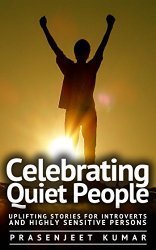

If you need to learn how to craft a murder scene in your novel, you will find plenty of articles and resources that other writers have shared so liberally on the internet or on their blogs. Simply google them and you will definitely find what you are looking for. I had to do some research on crafting a legal scene for my book Celebrating Quiet People: Uplifting Stories for Introverts and Highly Sensitive Persons where a shy, tongue tied law student participates in a mock court room competition against his more eloquent peers. I found plenty of really helpful resources on the internet that taught me how a fictional legal scene differs from a real one. For example you don’t quote excessive case laws, citations and procedures and bore your readers to death, something that you can’t do without if you were in a real courtroom with a real judge. Instead you focus more on emotions. Hey, this is fiction after all. For inspiration, I re-read John Grisham’s A Time to Kill, a book that I had read in my college days and enjoyed a lot. John Grisham does a fantastic job of crafting a legal scene and is definitely a worthwhile example to follow if you are thinking of writing anything legal.
Anyway, my simple point is that you can easily train yourself WITHOUT SPENDING A DIME. If you do have the resources to invest somewhere in training, buy a good book first that teaches you how to write fiction or whatever you want to write. This is what I do.
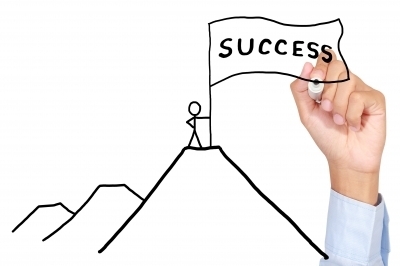 You will do far better by following a strong work ethic than attending any creative workshop. Discipline trumps talent every day. This is why it is important to write fast, have a cut-off date where you send your manuscript to your editors/beta-readers and have a deadline for publishing your book.
You will do far better by following a strong work ethic than attending any creative workshop. Discipline trumps talent every day. This is why it is important to write fast, have a cut-off date where you send your manuscript to your editors/beta-readers and have a deadline for publishing your book.
Image Courtesy of Pakorn/FreeDigitalPhotos.net
And finally remember one thing. You will never write a perfect book.
So once you are done, you are done. Move on to the next book. Practice, Practice, Practice!
Do share what your experience was after attending a creative workshop. Was it useful in your writing career?
The post Writing Without Spending a Dime appeared first on Publish With Prasen.
February 6, 2015
My Favourite Books in 2014

As you probably know already, I love reading motivational, inspirational and even self-improvement books.
In this post, I thought I should share with you a couple of my favourite books that I read in 2014 that, in my opinion, almost changed my life and my perspective. Some even inspired me to write about my own experiences.
The list could be quite long. So I decided to pick the four most important books that really appealed to me.
Image Courtesy of Kromkrathog/FreeDigitalPhotos.net
The Compound Effect by Darren Hardy
This is truly a path breaking book that gave me an immense sense of self-confidence and belief in myself.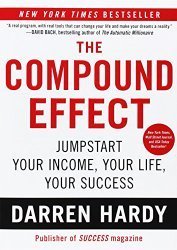

What this book stresses on is that there is no such thing as an overnight success. In real life, NO “get rich quick” schemes ever work. Success is always a result of small smart choices made every day over a period of time.
You may think of the compound effect in the following way:
Smart, small choices + consistency + time= Massive Results
Just keep taking simple, small steps every day and in time you will achieve the intended results.
The Compound Effect is always at work. You can either make it work for you or it will work against you.
He gives the example of three friends. One friend tries to improve himself every day. He spends some time with his wife, walks for half an hour, cuts 125 calories less in his diet and reads motivational stuff, every day.
The second friend does nothing and is a little bitter about life. He whines and complaints all the while.
The third friend rarely exercises, spends enormous amount of hours watching TV, takes his wife for granted and has a cookie and beer to enjoy life, every day.
The results after 2 and a half years: The third friend is now obese, has terrible health problems and has lost both job and wife.
The second friend remains the same, but is now more bitter than before.
The first friend remains trim, has a happy relationship with his wife and gets a job promotion.
You can see the compound effect in action.
It is the small things we do in life that make the biggest of differences. You don’t become obese overnight nor do you lose your wealth instantly. It is all a compound effect of bad decisions taken almost every day over a considerable period of time.
On the converse, you don’t become rich or healthy overnight. That is also a result of smart, small choices made almost every day over a considerable period of time.
So your biggest challenge is to remain consistent.
It is also very important to implement good habits and to get rid of the really bad ones.
The Principles of Success: How to Get from Where You are to Where You Want to Be by Jack Canfield
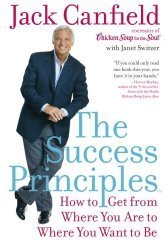
 This book talks about 67 timeless principles of success that the world’s most famous men and women have employed in their lives to transform their lives beyond their wildest dreams. My most important take-aways from this book are:
This book talks about 67 timeless principles of success that the world’s most famous men and women have employed in their lives to transform their lives beyond their wildest dreams. My most important take-aways from this book are:
Take 100% responsibility for your life: Don’t blame your luck or adverse astrological positions. Do whatever is in your hand.
Think about small successes in life: We are all conditioned to remember about our failures but if I were to ask you whether you had any success this week, you will struggle to remember any.
We all remember the bad things in our life but don’t remember the last time we were paid a compliment.
This book forces you to think of your small successes rather than failures. The Author asks you to maintain a diary (your victory log) where you jot down all forms of successes, be it a compliment, good grades, a new customer or you sticking to your routine. This really helps in improving your self-esteem.
Surround yourself with successful positive people: In order to be successful, you must surround yourself with positive people and do away with negative (toxic) people who slowly suck away all your happiness, just like a vampire sucks blood.
Quiet: The Power of Introverts in a World That Can’t Stop Talking by Susan Cain
Being somewhat of an introvert myself, which I thought was a handicap that needed to be “worked on”, this book actually helped me to become aware of my inner strengths.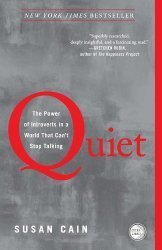

For a long time I had thought that there was something really wrong with me. Why did I not want to party after a busy work schedule? Why did I value deeper relationships than one night stands? Why did idle gossip, beyond a limit, leave me cold?
This book explained that introversion is not a disease. Introverts actually brim over with such God given gifts as: attentive listening, less risk taking, perseverance, conscientiousness, faithfulness, empathy, and creativity (there are many more).
Above all, this book inspired me to write about my own experiences which resulted into the writing of the Quiet Phoenix series.
Chicken Soup for the Soul: Stories to Open the Heart and Rekindle the Spirit by Jack Canfield and Mark Victor Hansen
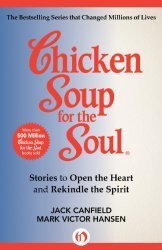
 This book is full of short, easily digestible motivational bed time stories. Every story is a “stand-alone”.
This book is full of short, easily digestible motivational bed time stories. Every story is a “stand-alone”.
This is where I read about Abraham Lincoln’s failures.
Another story I really loved was the ‘Golden Buddha’. The message was that all of us have gold within us, our only task should be to discover it.
This book inspired me to write Celebrating Quiet People: Uplifting Stories for Introverts and Highly Sensitive Persons.
I would love to hear about your book recommendations. Are there any particular types of books that fascinate you? Anything you read recently that you would like to share?
Prasenjeet Kumar
The post My Favourite Books in 2014 appeared first on Publish With Prasen.
January 24, 2015
Translate your books without spending a dime: the Babelcube way
Image Courtesy of Stuart Miles/FreeDigitalPhotos.net
Have you ever dreamt of having your books translated in other languages reaching untapped regions and markets AT NO COST whatsoever?
“No, this is impossible,” I used to think myself only about six months back.
I had heard about highbrow authors spending thousands of dollars to get their books translated into German, Spanish or even Chinese. But I knew that I just couldn’t afford to take that route at all.
Imagine my surprise when I realised that it is now absolutely possible (and eminently affordable) for us unknown authors too to “hire” translators. And a company known as Babelcube has made it all possible.
Babelcube claims that translators in more than ten languages are registered with them and that they can distribute your translated books to more than 300 retailers worldwide.
To be frank, this sounded too good to be true. So, I was admittedly very, very sceptical.
“Why should any translator take the risk of translating books of an unknown author without charging a hefty fee upfront?” I wondered.
Yet there was another part of me that said what the heck, why not give this concept a try? I had nothing much to lose; except the fear that my books may get pirated. But as I learnt from Paul Coelho, whose books were pirated in thousands in Russian, this may not be a bad thing at all for reducing your anonymity!
It didn’t cost anything to open a Babelcube account, to set up your profile, upload your book cover, add the book description, mention your current sales rank and attach the final manuscript in MS-Word. At the most, it may eat up half an hour from your writing schedule.
So I registered and uploaded all my books sometime in May 2014 and forgot about it. In a few weeks’ time, my reverie was disturbed when I started getting offers from translators from Turkey, Brazil, Italy and Spain who apparently saw a market for my books in their respective countries. This left me pleasantly surprised.
The good news is that you don’t need to pay anything to the translators upfront. What you have to do (and actually Babelcube does that too) is to share royalties with them from your actual sales on a sliding scale. For example, if your book sales be less than $2000, your translators get a 55% share, you as the rights holder get 35% and Babelcube keeps a flat 15% share. Your share keeps going up as your book sales go above the $2000 mark. You can see the details here.
Quality of translators
Some of the offers I got were from very well qualified translators. On Babelcube, you can check the profile of every translator. But many were simply college students looking to gain some exposure (and pocket money) before graduating. I had no problems with college students looking to gain some practical experience BUT was a little hesitant to let my manuscript be used as a guinea pig.
Issue of editor/proof reader
For my English manuscript, I take a lot of care insuring (oops ensuring)  that my book is error free and reads well. I wanted the same care to be taken with my translated books. Some people advised using Fiverr to find proof readers but I did not know if I could trust such people and whether it would be worth my while to incur costs outside the Babelcube framework.
that my book is error free and reads well. I wanted the same care to be taken with my translated books. Some people advised using Fiverr to find proof readers but I did not know if I could trust such people and whether it would be worth my while to incur costs outside the Babelcube framework.
Just then came my Eureka moment. Why not ask the translators themselves as to whether they work with an editor/proof reader; and if yes, then put their names too in the Babelcube contract with whatever share of revenue they would like to share with them. This would ensure that they both will have a suitable stake in the final product.
Some said that they proof read their own works which made me a little uncomfortable.
However, most of my translators managed to find an editor/proof reader on Babelcube and got their names too incorporated in their offers that they filed. Typically, the translators agreed to split the royalty between themselves and the proof readers in the ratio of 85:15, where the main translator gets 85% and the proof reader 15% (out of the 55% royalty that the translator gets below $ 2000 sales level).
KDP Select issue
Many of my author friends have told me that they would love to get their books translated but can’t because they are enrolled in KDP Select. For those who don’t know, KDP Select is a programme whereby you give exclusivity to Amazon in return for some very powerful promotional tools. This also means that your book (in its digital format and NOT in the print or audio book format) can NOT be made available for sale anywhere else on Apple, Kobo, Nook etc.
Whether this exclusivity will apply to their translated e-books was naturally the question that my author friends were curious to know the answer thereof.
The good news is that it does not. It is perfectly legitimate to have your books translated into other languages, even when they are on KDP Select, as seven of mine are. Surprised? 
Author Steve Scott specifically queried the Amazon guys about this issue. The reply was that a translated book is a different book altogether from the English one. It has a different title and a different book description, so there is no problem. Your KDP Select rules apply only to your English language book and not to the translated ones.
My experiences with Babelcube

 In December 2014, my first book ‘How To Cook In A Jiffy Even If You Have Never Boiled An Egg Before’ was translated into Portuguese. The working was smooth. I was concerned a bit about e-book formatting but Babelcube took care of that. My Portuguese translator, Ms. Patricia Chamorro was very pleasant to work with.
In December 2014, my first book ‘How To Cook In A Jiffy Even If You Have Never Boiled An Egg Before’ was translated into Portuguese. The working was smooth. I was concerned a bit about e-book formatting but Babelcube took care of that. My Portuguese translator, Ms. Patricia Chamorro was very pleasant to work with.
The book was distributed to Kobo, Apple, Barnes and Nobles, Baker and Taylor, Follet, Google Play, Scribd, Inkterra, Amazon, 3M, Chegg, Overdrive, Page Foundry, Gardner, etc in just a few weeks’ time. Phew! That’s more than Smashwords could ever manage even for my English books!
I was also pleasantly surprised to find sales immediately rolling in from Google Play and Apple. For others, there is apparently some lag in reporting, because as Mark Dresdner, CEO Babelcube explains, they don’t yet have “live connections” with many platforms.
But there were a few bad experiences as well.
The Negative Experience
One of the translators had agreed to translate my book into Spanish in 30 days. His profile looked very professional. He was a writer himself and had published two books in English on Amazon. I was impressed and decided to sign an agreement with him. A few weeks later, he told me that as he was planning to join a college, he could no longer continue with the translation. So he informed Babelcube accordingly.
That translator had also taken up other books to translate and he cancelled those agreements as well. This left the authors furious (including myself). As a result, the translator got a lot of 1 star and even .5 star ratings (yes, a .5 star is also possible on Babelcube). This will certainly harm his reputation if he ever tries his hands at translation again.
Image Courtesy of David Castillo Dominici/FreeDigitalPhotos.net
This experience was bad but I won’t blame Babelcube for this. The translator was completely at fault in this case having accepted too many offers and then backing out. This can happen to anyone, even outside the Babelcube system, and could be messier if the translator were paid some advance upfront. At least, here we didn’t lose any money and didn’t need to sue the translator to recover that advance. The loss was totally of the translator’s with most authors saying in their reviews that they will not recommend him to anyone else.
So even if a translator backed out of the agreement, there is nothing much to lose.
The Positives
 My other translators have been very nice to work with. Some have even asked very intelligent questions. My Italian translator is translating my second book ‘Home Style Indian Cooking In A Jiffy’ into Italian. In India, we use all kinds of cooking oils: mustard, groundnut, soya, sesame, coconut and even olive oil. However, when Italians say cooking oil, they only mean olive oil. So our translator asked us how she should translate this word? I had to tell her that if olive oil was the only kind of oil available in Italy, there should be no problem translating cooking oil as olive oil.
My other translators have been very nice to work with. Some have even asked very intelligent questions. My Italian translator is translating my second book ‘Home Style Indian Cooking In A Jiffy’ into Italian. In India, we use all kinds of cooking oils: mustard, groundnut, soya, sesame, coconut and even olive oil. However, when Italians say cooking oil, they only mean olive oil. So our translator asked us how she should translate this word? I had to tell her that if olive oil was the only kind of oil available in Italy, there should be no problem translating cooking oil as olive oil.
Image Courtesy of Stockimages/FreeDigitalPhotos.net
Promotional tools
Babelcube has introduced two promotional tools whereby you can make your book free for a limited period (for 7 days) on all e-book retailers or discount your book for 7 days on all retailer sites. This is somewhat similar to the KDP Select promotional tools. However, I have not used these tools so far, so I really cannot comment on their effectiveness. Babelcube also allows you to make your book perma-free (with the consent of your translator of course!) to boost visibility.
Pricing
Babelcube suggests to price your books between $2.99 and $9.99 which is the same as on Amazon.
Paperback
Babelcube has now introduced a Paperback option as well. You use the same manuscript for the e-Book that your translator sent to you without making any formatting changes. Cover design was an issue which I sorted out using the Create Space cover creator using the same image, except for the title that had to be translated. Finally I had to convert the jpeg image into pdf before uploading. There are lots of sites which convert your jpeg image into pdf. Simply google them.
It looks like Babelcube handles the rest through Draft2Digital, which takes some time. In my case, the paperback was published just today, so I will come back to this topic in greater detail the moment I have some more experience.
Conclusion
On the whole my experience has been quite positive with Babelcube. I’ve received interesting offers for all my books, but have inked agreements for the following:
How To Cook In A Jiffy Even If You Have Never Boiled An Egg Before: in Turkish (being translated) and Portuguese (already published).
Home Style Indian Cooking In A Jiffy: in Spanish and Italian
Healthy Cooking In A Jiffy: in Portuguese
If you have not opened an account with Babelcube, I strongly recommend that you do so. It takes some time to upload all your books with your author bio, book description, sales rank, etc but it is certainly worth it.
Disclaimer: I am not affiliated with Babelcube in any way!
Have you ever thought of getting your books translated? Have you had any experiences with Babelcube? Any good or bad experience? I would love to hear your views on this?
Regards,
Prasenjeet
The post Translate your books without spending a dime: the Babelcube way appeared first on Publish With Prasen.
January 3, 2015
Indie Author Pack Review: Three Classics in one go
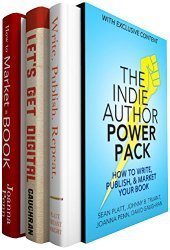
 I was fortunate enough to get hold of a copy of the Indie Author Pack when it was on pre-order.
I was fortunate enough to get hold of a copy of the Indie Author Pack when it was on pre-order.
Undoubtedly, this pack is a real value for money, as it is a box set of three truly classical books on self-publishing: Write, Publish, Repeat by Sean Platt and Johnny B. Truant, Let’s Get Digital by David Gaughran and How to Market a Book by Joanna Penn.
If you are, however, looking for quick fixes or ‘How-to-strategies’ to game the Amazon eco-system, I must warn you that these three will leave you frustrated. So, invest in this pack only if you are serious about pursuing your writing career, in an upright and ethical manner, regardless of whether you write fiction or non-fiction, or both.
Write, Publish, Repeat
This book is ‘chock full of advice,’ coming as it does from two legendary authors, Sean Platt and Johnny B. Truant. It covers anything and everything that you need to know about self-publishing. I especially liked the fact that Sean Platt and Johnny B. Truant talk about their struggling days and how they reached where they are now. The first few sections make you realise that there is no shortcut to success or “overnight success”. For me, this was a great personal touch.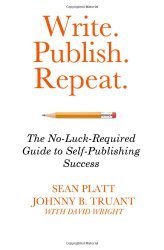

Incidentally, the duo claim to have written more than 1.5 million words in a single year!
Coming back to the book, it goes in great detail about the changing landscape in the self-publishing ‘industry’ and answers questions about the truths and myths commonly floating around both in the self-publishing and traditional publishing world today.
It next discusses the nitty-gritties of writing the kind of books your readers will love. This section covers planning your story, finishing your book in a month, hiring professional editors (or working with editors at no cost, which is possible only if you are married to one!) and steps to take to avoid looking like an amateur.
The book next talks about marketing. My biggest take away has been on the concept of funnels. Simply put, a product funnel is a way of organising your works so that one product leads logically into another. This means that if you have a series of books, price the first one as permanently free or ‘perma-free’ as is widely known in the indie author world. In this post, I will not explain how can you make your book perma-free but I will dive straight into the heart of this strategy.
One of the biggest challenges that indie authors face is that they are pretty unknown to their readers. Your book does not stand out from the million other books floating in the Amazon stratosphere. Readers are hesitant to spend money if they are unsure what they will get in return. Therefore, to earn the trust of the readers, the best strategy could be to make your first book permanently free.
This is your funnel. This ‘perma-free’ book should mention your other books and invite readers to join your mailing list at the end. Readers who thus want to sample your writing style are enabled to do so at zero risk to them. Suddenly the barrier between you as an author and your readers is removed.
Unless of course you are a Dan Brown or J.K. Rowling and can sell millions of copies in a single day on your own!
However, if you struggle to sell even a few in a weeks’ time, you need to think about implementing this strategy seriously.
Think about Angry Birds! Would they have made millions if their basic version of the gaming app was not free to download on most mobile phones?
Just remember, most free books are not at all read. Some will read your book and say that it is “not their cup of tea”. However, your goal is to reach and then focus on that small group of readers who love your book and want more from you. The ‘funnel’ or ‘perma-free’ strategy could then be one of the best and the most cost efficient way to building your tribe.
Incidentally, following this advice rather seriously, I have made my cookbook How to Create a Complete Meal in a Jiffy perma-free.
The basic mantra of the book: Write, Publish, Repeat is that as a writer, your job is to keep writing. Without writing, nothing will work. No book will sell. And obviously no marketing strategy will work. The more you write, the more confident you become, and the more can you experiment with titles, keywords or your perma-free books.
After publishing nine books, I have myself realised that my confidence has grown by a good 5000 times than last year.
How to Market a Book
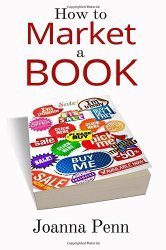
 As a self-published author, your job description (if I may use that term) entails not only writing books but also marketing them. NY Times and USA Today Best-selling Author Joanna Penn has, in that context, written a fantastic book on marketing.
As a self-published author, your job description (if I may use that term) entails not only writing books but also marketing them. NY Times and USA Today Best-selling Author Joanna Penn has, in that context, written a fantastic book on marketing.
This is probably the best marketing book I’ve read so far. The book covers both short term and long term marketing strategies. It includes strategies like optimising your Amazon sales page, searching for relevant keywords (short term marketing) and selling your books via your blog and e-mail list (your Author Platform or long term marketing).
I’ve done a more detailed review of this book here.
Let’s Get Digital
This is another excellent book on self-publishing written by David Gaughran, author of two historical adventures, “A Storm Hits Valparaiso” and “Mercenary” and a non-fiction book “Let’s Get Visible”.
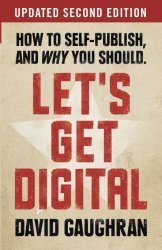

This book covers more or less the same issues as the previous two in the Indie Author Pack. However, what I really liked about David is his sincere and rather upbeat advice. He tells us not to worry about book sales too much and focus on larger issues. The best part of the book is that it has a long list of interviews of successful authors.
On the downside, there is some overlap between these three books (which in my opinion is hardly anything bad!). For example, all three discuss the importance of building up your email list which just reinforces that this strategy must be your No. 1 priority, if it is not already.
On the whole, this box set is great value for everyone, regardless of whether you have just started out or are already an experienced Author. All three books bought separately could cost you almost $15 but this box set, started as it did at $0.99 and climbing up every month, is guaranteed to save you a lot of money.
You may want to preview this book here.
The post Indie Author Pack Review: Three Classics in one go appeared first on Publish With Prasen.
December 20, 2014
Three Things That All Self-Published Authors can Learn From Abraham Lincoln
I keep hearing some self-published authors cringing and whining all the time about how difficult it is to pursue a career as a writer. Sure, many are passionate about what they write, yet they are willing to give it all up after a year exclaiming that “the chances of success as an indie author is relatively low.”
Others become obsessively focussed on results.
“I paid sites for advertising my book but I got only 40 sales in two days!” complain some.
And then there is the third type who will tell you that it is better to be an accountant or a consultant than a writer. Such types have obviously not witnessed or experienced for themselves the downsides of a day job, including what it is like to work with autocratic bosses and annoying colleagues.
Let me admit that I am not completely free from this mind-set.
But let me come back to the things that all authors can learn from Abraham Lincoln. Why Abraham Lincoln, you might ask? Surely, he was one of the greatest Presidents America ever saw. But there was more to him than just that.
Abraham Lincoln had a great knack for self-learning: I stumbled upon this story when I was doing research for my next motivational book.
Abraham Lincoln was his own guru. He was born in poverty with very little schooling. Yet Lincoln did not make his poverty an excuse to run away from education. His father could barely read and write. His mother was a little better, so Lincoln’s first teacher was his mother.
Other children used to practice writing on paper but there was no paper in Abraham’s house. So he practised writing and maths at the back of a wooden spoon using charcoal as his pencil. Lincoln mastered grammar, language and expression all by himself. He learnt maths, including geometry and trigonometry, again totally on his own.
He practised public speaking in front of his friends and diligently studied Shakespeare. He even once told a student to “always bear in mind that your own resolution to succeed is more important than any one thing.”
During his lawyer days, he would meet up with his friends in the evening and engage in story-telling contests. He was considered to be a self-taught lawyer who read and re-read Blackstone’s Commentaries till he understood them thoroughly.
He also learnt the trades of boatman, merchant, clerk, postmaster, surveyor, in addition of that of a lawyer, before he was elected as a U.S. Congressman in his thirties.
Author Jennifer Kahnweiler calls Abraham Lincoln a “geek” meaning someone who possessed deep knowledge about a subject. Lincoln was the most sought after Patent and Copyright lawyer in Illinois.
He later on in his career as a President acquired the skills and deep knowledge about voting behaviour. He had a firm grasp of voting patterns, turnouts, and trends.
No wonder Abraham Lincoln was one of the greatest leaders to walk on this Earth.
If you have to succeed as a self-published author, therefore, commit yourself to a life of self-discipline and self-learning.
I started my career in early 2013 as a blogger. I first pursued web designing as a hobby. I found online courses at no cost on a site called Alison.com which taught me basic html, wordpress, setting up an email list, engaging on social media, etc. I started running a blog known as cookinginajiffy.com with my mom’s recipes.
Some of my social media friends told me that I write well. This opened up a possibility to pursue a writing career. At that time I did not know that I could self-publish and sell books on Amazon. But soon I learnt how I could do that on Amazon and other platforms without the need to approach any traditional publisher.
I wrote my first book in about three months. I was apprehensive about e-book formatting but easily found a dearth of YouTube videos that taught me to how to do that properly.
Since then I have never stopped learning and never looked back. Internet provides us with up-to-date, and mostly free information so there is no excuse whatsoever not to learn. At least in that respect we are better off than Abraham Lincoln!
Book sales are not within your control but self-learning certainly is.
But let us come back to Lincoln and focus on some other of his traits which are relevant to authors.
Abraham Lincoln had a never give-up attitude: He lost his mother (due to a disease called milk sickness) when he was a young boy. He lost a job, failed in business twice, was defeated in elections eight times, became bankrupt and incurred a debt which took nearly seventeen years to be repaid, suffered a nervous breakdown and was bed ridden for six months and he had to deal with the loss of the woman he deeply loved (Anne Rutledge). The list of his failures do not end here and if I were to list all of them, I am sure they would run into pages.
Yet the biggest lesson one can take away from this narration is that Abraham Lincoln never quit. He could have very easily considered himself “unlucky” or that he was destined to fail. But Lincoln did not let his destiny dictate his actions, instead he dictated his own destiny.
Food for thought: It is very easy to “quit” but how about making “persisting” a habit?
Abraham Lincoln was passionate about his work: He had a clear vision. He sincerely believed that he had a purpose to fulfil.
“Every man is said to have his peculiar ambition,” he wrote once. “I have no other so great as that of being truly esteemed by fellow men, by rendering myself worthy of their esteem.”
Lincoln acted out of deep commitment and passion for his work rather than showing his might as the President of the United States. His lifelong motivation was to eradicate slavery completely from his country once and for all. Lincoln could convince others only because he believed in his own noble cause himself.
He was not after power or money. “His speaking went to the heart because it came from the heart,” as was reported by Horace White. Lincoln’s passion for his work and compassion for others made him stand out as a great benevolent leader.
Food for thought: Are you passionate about your work?
I would love to hear your story. How did you end up being a writer? What did your “other” career, if you had one, teach you? Were there any highs and lows? Was there any time when you thought you should quit but didn’t?
Regards,
Prasenjeet
The post Three Things That All Self-Published Authors can Learn From Abraham Lincoln appeared first on Publish With Prasen.
December 7, 2014
The Compound Effect in Your Writing Career
Image Courtesy of FreeDigitalPhotos.net/cooldesign
I hope you are NOT reflecting too much on how difficult it is to be a self-published author.
I know how you work extremely hard writing a book, then edit it, format it, design an eye-catching cover and publish it on Amazon. Or on whichever other favourite eBook publishing platform you prefer.
Then you wait. And as weeks go by, no one seems to notice. Meanwhile the perceived sniggers from friends, relatives, and your spouse become too much to bear.
So you give up, and join the list of so many authors who give up within a year of the start of their writing careers.
But CHEER UP.
Recently, I read a very inspiring book that gave me an immense sense of self-confidence and belief in myself. The name of the book is “The Compound Effect” by Darren Hardy.
Darren asks you to think of the compound effect in the following way:
Smart, small choices + consistency + time= Massive Results
As per this book, one year might be a very small amount of time to look at results. The minimum time the compound effect takes to set in is anywhere between 2 and a half years to 3 years. 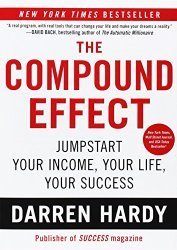

There is no such thing as a get rich quick scheme or an overnight success. Just keep taking simple, small steps every day and with time you will achieve the intended results.
According to Darren Hardy, the Compound Effect is always at work.
You can either make it work for you or it will work against you.
He gives the example of three friends. One friend tries to improve himself every day. He spends some time with his wife, walks for half an hour, cuts 125 calories less in his diet and reads motivational books, every day.
The second friend does nothing and is a little bitter about life. He whines and complaints all the while.
The third friend rarely exercises, spends enormous amount of hours watching TV, takes his wife for granted and has a cookie and beer to enjoy life, every day.
The result after 2 and a half years: The third friend is now obese, has terrible health problems and loses his job and wife. The second friend remains the same and is now bitterer than before. The first friend remains trim, has a happy relationship with his wife and gets a job promotion.
You can see the compound effect in action.
It is the small things we do in life that makes the biggest of differences. You don’t become obese overnight nor do you lose your wealth instantly. It is all a compound effect of bad decisions taken almost every day over a considerable period of time.
On the converse, you don’t become rich or healthy overnight. That is also a result of smart, small choices made almost every day over a considerable period of time. So your biggest challenge is to remain consistent. It is also very important to implement good habits and to get rid of bad ones.
So how does this impact your self-publishing career?
In a year’s time, I have written 8 books. All my books are of the length of 20,000 to 40,000 words. I have made a habit of writing at least 1000 words in a day. On some days, my time is spent exclusively on book marketing.
Still 1,000 words x 30 days= 30,000 words (one book)
In this way you can write one book in just one month. The other month is spent on editing, formatting and of course, marketing.
In my self-publishing report, I have already talked about overcoming the writer’s block.
Many authors try to do too many things. They try to write a book, then blog, do podcast shows, shoot for YouTube videos, try to be active on Facebook, Twitter, Pinterest and when nothing works they throw up the towel, burn out and crash.
Yes, being a self-published author can be quite overwhelming and to be frank, sometimes I also despair.
However, a better idea is to concentrate on one thing at a time. Decide what you want to do TODAY.
If I am writing a book, I sometimes decide that I am only going to write my book today and do nothing else.
On certain days, I only write more blog posts and messages for my e-mail subscribers.
On some days when I don’t feel like writing, I will read a new book on self-publishing and try to implement some new idea.
Focussing on one thing is always easier than juggling so many.
Hopefully, in a few years’ time, the Compound Effect will give me too enough momentum to keep me propelled for life.
Have you experienced the compound effect in any part of your life? I would love to hear your views on this.
Regards,
Prasenjeet
The post The Compound Effect in Your Writing Career appeared first on Publish With Prasen.
November 15, 2014
A Truly Inspiring Story About a Writer
Image Courtesy of FreeDigitalPhotos.net/Thaikrit
Today I thought I should share a story with you, a story which I personally found to be very motivating and inspiring. I happened to stumble upon this story while researching for my next book in the Quiet Phoenix series.
We, writers, have to face a lot of challenges in our writing career. Fear of failure, whether your writing career will pay your bills, whether readers will love your books, what your spouse is going to think about you, etc. In that background I found this story to be very uplifting.
So here is the story…..
Joanne loved reading fantasy books as a little girl and even tried writing some short stories. Like a typical introvert, she had a rich imagination. Wizards, magic and sorcery formed part of her world. She thought she should be a novelist. But she came from an impoverished background. Her parents wanted her to do a vocational course—a course that would empower her to secure a real job in the real world.
“Your overactive imagination is good for amusing people but not enough to pay for a mortgage or for securing a pension, my little girl,” her parents told her.
Joanne’s parents were being practical. After all, there is nothing noble about poverty.
Joanne loved her fantasy world. That universe was a part of her. Leaving that world was as traumatic as separating from your loved and dear ones.
In the university, Joanne’s parents wanted her to do a “useful” course while she wanted to study English literature. Joanne did not want to upset her parents. So she agreed to pursue a degree in modern languages. However, at the last moment, she enrolled herself in a course in Classics not informing her parents about her sudden change in decision.
University life was a different world altogether. A world where students were busy attending lectures, seminars and preparing for tutorials. Some worried about their careers after graduation. Some were simply partying and having fun. But Joanne was spending her time mostly in coffee bars writing stories and sometimes not even attending lectures. She was lucky to pass her exams.
In her mid-20s, she took up secretarial jobs. Then she got married and had a daughter. During lunch sessions, her writing bug did not leave her. Her employers noticed that Joanne was not paying attention to work. As a result, she lost her job numerous times.
Sadly, Joanne also had a failed marriage. Her world was crashing down all around her. There seemed no hope. She was miserably alone with an exceptionally short-lived marriage, jobless, a lone parent with a daughter to look after, and as poor as it was possible to be in modern Britain, “without being homeless”. The fears that her parents nursed about her, and that she had for herself, had come true. She felt as if she was the biggest failure from any standard.
Joanne even contemplated suicide. There seemed nothing to look forward to in this world for her.
However, her daughter was something that made her come down to earth. Abandoning her for escaping from this world was definitely not the right thing to do.
Joanne decided to take full control of her life. Failure had taught her things that she never knew about herself. Failure made her discover her true self. It gave her an inner security which did not come from passing university examinations. Joanne realised that she had more strong will and discipline than she ever thought she had, which are also classic strengths of an introvert. Plus she had an old type writer and a story to tell to the world.
Joanne stopped believing that she could do nothing better than make a living out of a day job. She stopped suppressing her creative self which was supposedly of no use in the ‘real world’. One day on a train journey from London to Manchester and back, Joanne created a story of a boy wizard in her mind. She thought that to be a good bed time story for her daughter. Joanne had a pen that did not function and she was too shy to ask for one.
It was years later when she got down to writing that entire story, spending most of her time in a coffee shop. The owners did not want her to spend the whole day writing in long hand while ordering only one cup of coffee. Joanne remained determined.
A few years down the line, Joanne finished her manuscript. She had written 700 pages in long hand and then manually typed it. She now had to send the manuscript to publishers.
“Children’s stories have no market”, she was told straight to her face. Her manuscript was rejected one after another by twelve publishers. It was very easy to give up at that juncture. Joanne had never had any success in life. It seemed as if her life was jinxed.
Yet Joanne persisted. She sent her manuscript to the 13th publisher.
After a year, her wizard story finally found a home at Bloomsbury. She was granted a miserly $1500 advance. Her publisher advised her to keep her day job, as there just wasn’t enough money in children’s literature.
The first printing of her book had a run of 1,000 copies, 500 of which were sent to libraries. Today, those original 1,000 books are worth $16,000 to $25,000. In early 1998, an auction was held in the U.S. for the rights to publish the book. Scholastic Inc won and paid Joanne $105,000. The book was published in the U.S. The money from the U.S. sale enabled Joanne and her daughter to move into a new home.
Her book attracted millions of fans from the world over, irrespective of culture or nationality, children or adult. She became the first person to become a billionaire from her books.
In 2006, Joanne released the seventh and the final book in the series that sold more than 400 million books worldwide. Her books have been translated into 65 different languages.
Joanne’s patience, persistence and an unshakeable belief in herself more than paid off in the end. She is now happily married and has a son and a daughter.
Yes, you guessed it right.
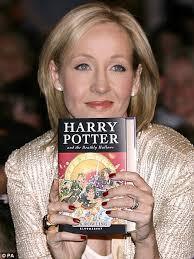 I am indeed talking about the famous J.K. Rowling. Her first book, a boy wizard story, was Harry Potter and the Philosopher’s Stone. Today, the Harry Potter brand along with its movie franchisee, is worth billions of dollars.
I am indeed talking about the famous J.K. Rowling. Her first book, a boy wizard story, was Harry Potter and the Philosopher’s Stone. Today, the Harry Potter brand along with its movie franchisee, is worth billions of dollars.
I would want to hear your views on this. Did you find the story inspiring?
Feel free to leave your comments below.
Regards,
Prasenjeet
The post A Truly Inspiring Story About a Writer appeared first on Publish With Prasen.
November 2, 2014
Business For Authors: Viewing Your Writing Profession as a “Business”
I thought today I should share with you a book which I found to be really helpful for self-published authors.
Most Authors make the mistake of viewing their writing as a hobby or as art that they indulge in more for love than for money. There is nothing wrong with this attitude.
However, if you are really serious about making a full time income from writing, you need to view your books as “products”, your editors, translators, and book cover designers as “suppliers”, your readers as “customers” and your writing career as “customer service” whereby you write one book after the other to keep your readers (i.e. customers) happy.
This means that you should see your writing career as a “business” and yourself as an “entrepreneur”. “Business for Authors” by Joanna Penn teaches you exactly that.
NY Times and USA Today Best Selling Author Joanna Penn has pooled in all of her six years of experience as an Author Entrepreneur (a term I love) and thirteen years of experience as an IT Consultant into the writing of this book. Her blog thecreativepenn.com has been voted as the Top 10 blogs for Writers and Self Publishers since 2012. This in itself makes the book worth reading for any author, self-published or traditionally published, new or experienced.
What I really liked about the book is Joanna’s honesty in giving advice. This book is not meant for those who are looking to make a quick buck.
Some of the salient features of the book are:
Whether writing a book is a good business model in itself: Joanna has come up with tests to determine whether an idea can be a good implementable business model that also makes a profit. She comes to the conclusion that writing a book is good business and I agree with her. However, you can use her test to reach your own conclusion.
Is it a good idea to start a company: You don’t really need to. But if you want to, Joanna discusses the various benefits of starting your own company.
Various business models that authors follow: Some authors supplement their writing career with selling courses, speaking assignments, editing services or even teaching how to write. Others simply keep on writing more books and in the long run hope to earn a full time income through their books only. This discussion can help you in identifying and clarifying which business model you should like to follow.
Working with editors, cover designers, translators and publishers
Should you hire a virtual assistant: Joanna talks about the pros and cons of keeping a virtual assistant. Being a self-published author for over a year and with seven books under my belt, I am still struggling with this issue myself. However, her experience has cleared my thoughts.
Your customers: She asks you to make a note of your typical reader and where they hang out. A hint is that your typical reader is very likely to be like you.
Sales and distributions: She discusses many options like selling through distributors like Createspace, Amazon, Kobo and Smashwords versus selling directly through your blog.
What Joanna says about traditional publishers is very important: Most authors crave for a traditional publishing deal but Joanna warns you to be careful in giving away all your rights cheaply to get a traditional publishing deal. I was surprised to find that one of her literary agents had a clause whereby he would earn 15% of anything Joanna publishes including her self-published books (where the agent would have no contribution)! Naturally that agent had to be shown the door.
On the whole “Business For Authors” is a well-written and such a comprehensive book that as a wannabe author you may take months to digest.
I only wish that while Joanna had some good words for e-marketing sites like Bookbub.com, she could have offered advice on a lot of other competing sites which are either free or not so exorbitantly priced as Bookbub.
Similarly I’d have loved her views on the FREE book translation site Babelcube, which she just doesn’t mention.
Still, this is a gem of a book which I highly recommend to any Author who is looking to make a career out of writing through either self-publishing or traditional publishing.
Regards,
Prasenjeet
The post Business For Authors: Viewing Your Writing Profession as a “Business” appeared first on Publish With Prasen.
October 17, 2014
Celebrating The Quiet Child: A Must Read For every Parent, Teacher, Mentor, Sports Coach……..
I thought I should share with you the news about a book that I have just written in another genre. This is actually a sequel to my book Quiet Phoenix: An Introvert’s Guide to Rising in Career & Life that was Amazon #1 Bestseller in the Hot New Releases category in Behavioural Psychology and in Legal Profession.
The name of this book is “Quiet Phoenix 2: From Failure to Fulfilment: A Memoir of an Introverted Child”, and it basically celebrates the special characteristics of Quiet or Introverted Children.
The underlying theme of the book is that just as a Phoenix Bird is hardwired to be reborn from the ashes of her ancestors, her tears are meant to cure wounds and she symbolises undying hope and optimism, so is your Quiet child built for persistence, creativity, and self-discipline; and for displaying a knack for self-learning, high emotional intelligence and an impeccable sense of moral responsibility.
Instead of cherishing such rare traits
Introverts are sadly often misunderstood by almost every one.
Parents worry if their children prefer spending time in solitude, probably day dreaming.
Teachers presume that if a child hesitates to answer questions, she must be having some kind of learning or even social disability.
Quiet Children have difficulties in making friends, with their classmates seeing them as “weird”, “rude” or “arrogant”.
They are seen as “over” sensitive to mean comments or bullying.
They appear to lack aggression or as some say ‘the will to fight back’.
Overall, introverted children seem to be more flustered about almost every facet of life in noisy and large Public Schools.
Any advice that Quiet children should be more ‘outgoing’, ‘sociable’ and ‘active’ seems to be counterproductive.
Any aggressive follow up on this advice often results in your Quiet child losing her self-esteem, forcing her to become even more withdrawn.
With fables, stories and real incidents from my own childhood “Quiet Phoenix 2: From Failure to Fulfilment”
Reiterates that introvert Children being asked to behave in a more extroverted fashion is like asking a young Phoenix bird to behave like an Eagle.
Every child is born with some unique traits. The challenge is: how parents, teachers and friends can recognize, nurture and enhance those powers so that every child, quiet or loquacious, becomes a winner.
“Quiet Phoenix 2: From Failure to Fulfilment” sincerely intends to help everyone dealing with ‘Quiet Children’ to cherish and celebrate them for what they are.
And to help them rise above everything; to lead them towards a path of happiness leaving behind all old memories of pain and isolation; and to turn them into life’s winners.
Just like the Phoenix rising from the ashes.
With real life characters like Ms. Brownie Points, Mr. Noisy Ferrari and Ms. Pencil Snatcher, this book is intended for everyone–a parent, teacher, or sports Coach……
Who wants to understand how to harness the powers of Quiet children in an extroverted world.
And if you are an introvert adult, you may find this book useful in understanding yourself, your past and what you want out of life in the future.
Regards,
Prasenjeet
The post Celebrating The Quiet Child: A Must Read For every Parent, Teacher, Mentor, Sports Coach…….. appeared first on Publish With Prasen.
September 5, 2014
10 Habits of a Successfully Self Published Author
Image Courtesy of FreeDigitalPhotos.net/Lamnee
So, you think you have a knack for writing and have heard that these days you do not need to knock at the doors of traditional publishers to become famous. Amazon, Kobo, Barnes & Nobles, Apple, Smashwords and other e-retailers have given you the option to publish your own books.
Hurray!
You feel that there is nothing that can now separate you from your readers.
You then get down to writing and take a few months to finish your magnum opus. Your friends and family members help you with editing. You are a little nervous about e-book formatting and cover designing. You watch a few video tutorials on You Tube.
After watching these, you confidently format your books. You design the cover on your own or a friend skilled in Photoshop or PowerPoint helps you out and you finally hit the publish button.
After 12 hours, you receive a message from KDP that your book is now live on the Amazon store.
You celebrate with your friends and family members. Wow, your book is available for purchase in over 100 countries, and not just the USA.
You are now an international Author!
You login to your KDP account the next day and check your sales report.
“No sales to report during this period” says the KDP dashboard. You are not disappointed. After all, this is only the first day.
You broadcast the message, on Facebook and Twitter, to all your friends and family members. You then get back to login to your KDP dashboard to check the sales figures, every day.
Nothing. Zilch. You realise that for months, you did not sell even a single copy.
This makes you angry, frustrated and overwhelmed. You had heard of Authors selling 200 copies a day. And of those million dollar advances that Dan Brown gets from traditional publishers. Now you start getting depressed.
“Am I the only fool who is not selling even a single copy”, you think to yourself.
You begin to have self-doubts. You believe that there must be something that you are doing wrong. So you start surfing the internet as to what other successful authors do.
You read about building an Author Platform and building an e-mail list containing thousands of subscribers. Some advise you to blog. Others say podcasting or creating You Tube Videos is better. You read something about Social Media.
You read articles, and sometimes books, with the following titles:
“How I earned a six figure income using Twitter.”
“How to leverage Facebook to build a huge fan following.”
You are told that Pinterest is great, that all Authors should use Tumblr or Squidoo. No, no, Stumble Upon is the next shining thing. This leaves you extremely overwhelmed.
You wonder how successful Authors have built such a huge following. You want to live your dreams but you don’t know what steps to take. You are swayed by powerful negative emotions. You have to pay your mortgage, and your children’s school fees. After six months of hand wringing, your wife now thinks that you should probably take up a REAL job.
You desperately want to be the Author who has written over 40 Kindle books, has a vibrant blog with over 1000 articles, Podcasts and Videos and has over 30,000 followers on Twitter, Facebook and Google Plus.
The million dollar question is: how can you achieve that?
The solution is shockingly simple. There are no magic pills or potions as Mr. Warren Adler, Author of the “War of the Roses”, once said.
You need to adopt habits of all successfully self-published authors and change your mind-set.
If you feel confused and perplexed, let me show you how to go about this.
1 Accept the fact that building an Author Platform takes time
Rome wasn’t built in a day and nor will be your Author Platform. This was my first realisation. The sooner you accept this, the better it will be for you. Do not be too impressed by reading about that Author who is selling 200 copies in a day; instead read about his or her struggling days. This is the first change in habit that you need to make.
Most authors are pretty honest about their struggling days. They will tell you that in their first year, they literally sold a few copies. A few! I heard a podcast interview of Steve Scott where he mentioned that he has been running online businesses since 2005, and it is now 2014! He talked about the days when he floundered and tried to make money out of loopholes that soon closed.
This will make you realise that you are not the only dude who is struggling to make a living.
2 Take things slowly
Understand that you need to take things slowly to their logical conclusion. Always remember that:
Small, smart choices + consistency + time= Massive Results
Therefore, do not be in a hurry to jump at everything you read or hear. Remain focussed. Write one book, publish it and use the KDP Select Promo days efficiently. Then move on to write another book. You not only need to develop good habits but need to be also consistent.
3 Channelize negative emotions to yield positive results
Remember, your biggest weakness would be your negative emotions.
“When will I become successful?”
“Am I moving in the right direction?”
“Life was much better a few years ago.”
“How will I pay bills this month?”
“How much time will it all take?”
You would be very sensitive to criticism. But if you hear and read some author interviews, you will realize that you are not the only one encountering these emotions. Sometimes negative emotions can be paralyzing. Many authors give up on their dreams because they get crippled by such negative emotions.
But negative emotions may not be such a bad thing after all. This is what I learnt the hard way. A few years back I used to work in a posh corporate law firm. I had no great desire to rise to the top, so I never felt frustrated.
Now I want to rise to the top and sometimes feel very impatient about it. But that is a good thing. You can only move up if you so desire. My negative emotions are simply telling me to work harder and develop good habits that will take me to newer heights.
So if the thought of paying your mortgages scares you, it only means that you should be writing more and working harder.
Your negative emotions can be the biggest factor in your success. Channelize it well. Whenever you are swayed by negative emotions, interpret these to motivate you than depress.
4 Treat your Writing Career as a Full Time Profession
Most Authors have a day job but some (like me) work from home. The trouble about working from home is that you do not consider your writing career as a full time day job.
It is very easy to wander. You do not feel like writing. You think that you are probably unemployed.
I think this is the biggest disservice you are doing to yourself and to your writing profession.
The most important thing to do is to challenge this mentality. Do not consider yourself worthless or unemployed. Instead think that you are a self-employed Author Entrepreneur. I love to call myself that.
When I used to work in a corporate law firm, I found that it did not operate on a 9-5 fixed working hours basis. Most of the days, your boss would dump a pile of work at 6 p.m. and ask you to finish all that the very same night.
“Haven’t you heard about going the extra mile…” your bosses would tell you. And you had no option but to happily accept the work and work all night and often on weekends.
Why not have the very same mind-set when you are working on your own? Why not consider your writing job as your day job? Why not write every day thinking that this is what you are being paid to do, as you would have with any other employment?
The moment I started considering my writing career as my new job, wonderful things started to happen. In my law firm days, I hated my work and did not feel like going to office on a Monday morning. Now I look forward to beginning my day whether it is writing a new book, a guest post, or a message to my e-mail subscribers.
5 Keep Writing
One of the major reasons for failure for authors is that some writers don’t spend enough time writing.
My father jokes that you cannot be a writer without writing anything.
If you look at all successful authors, they have all written more than one book. Some have written over 40 books while others have written at least 10.
As a writer, make it a habit to write every day whether you are writing a new book or a blog post/guest post. I understand that developing this new habit can be difficult. But it will pay to develop one.
Most writers have a ritual before they write. I feel that I am pretty fresh during mornings. However, when I actually sit down to write, I realise that I need to warm up. Ideas do not flow easily.
So sometimes I listen to music. This relaxes me. Or I read something motivational, usually a success story of a creative person, be it an artist, actor or a self-published author. This fuels me for the day and I soon get into the mood for writing.
When I start writing, I have noticed that I do not stop. The most difficult part is writing the first few hundred words, after that it is easy.
Other Authors block their social media accounts, switch off their cell phones and ask their family members not to disturb them, while they lock themselves up in a quiet room and write for two hours, without a break.
So find out what works for you and “routinize” it.
6 Do one thing at a time
A better idea is to concentrate on one thing at a time. Decide what you want to do TODAY.
If I am writing a book, I sometimes decide that I am only going to write my book today and do nothing else.
On certain days, I only write more blog posts and messages for my e-mail subscribers.
On some days when I don’t feel like writing, I will read a new book on self-publishing and try to implement those ideas into practice.
Focussing on one thing is always easier than juggling so many.
7 Do one thing in a year
As a self-published author, you have to wear many hats. You have to write your next book, build relationships with influencers and readers, be active on social media and also focus on content marketing.
As Joanna Penn says, many authors try to write books, be active on Facebook and Twitter, create videos and podcasts, blog and when nothing works in about a week, they burn out and give up.
Steve Scott on many occasions has spoken about the 80/20 rule and hanging out on one or two social media networks only. I take this advice seriously and have started only with Twitter and Google Plus. In two months’ time, my twitter followers have grown to over 400. In a year’s time, I hope that this number crosses 1000.
I didn’t set up a Facebook fan page because I don’t like the fact that I need to pay money to Facebook to interact with my fans.
I am only concentrating on blogging and writing more books. Hopefully, in a year or two, when I’m a little stable with my blog, I may venture into podcasts or making You Tube videos. Or I may like to stick around with blogging only.
This way, you ensure that you remain focussed on a few tasks. Remember it is a long term game. So it is important to slowly change your habits for a long lasting impact.
8 Uptime and Downtime
Small changes in habit and time management can ensure that you can focus on writing and also engage with your fans on social media and e-mail.
Every author has an uptime and downtime. Use your uptime for your most productive work and downtime for interacting on social media or in learning a new skill.
I find that I am the freshest in the mornings (like most authors). However, I have also realised that I need a warm up session to clear my thoughts.
So I spend a few minutes (hardly 5-10) on social media. I “follow back” some of my followers on Twitter. I also like reading something motivational in the morning. A great success story of an artist or tips on becoming a better author or marketer. This is generally enough to charge me for the day.
I share these articles on Twitter, Google Plus and Stumble Upon by using the share button at the side or at the end of these articles. My shared articles are quite often “retweeted”, “favourited” and “plus oned” on social media.
If I am in the mood, I tweet influencers. I don’t ask for any favours but simply show my gratefulness to that person for a tip or idea that may have impressed me.
Then I log out of social media and spend most of my day writing. I decide whether I need to write my book or write a blog post and stick to it.
In the evenings when I feel I’m a little dull, I listen to podcasts or watch videos about the self-publishing industry. Whatever I learn, I try to implement.
I can understand that it can be very difficult to write a 30,000 word book and also blog at the same time. Plus you also need to engage with your subscribers. I blog twice a month so that my blogs look updated to all visitors. This strategy is better than writing 20 blog posts in a month and then not post anything after that.
I write a blog post in such a way that it can easily be turned into an email to subscribers. Whenever I update my blog, I also send an e-mail to my subscribers and share the blog post on social media using the share button.
It is in this way that I am able to ensure that I not only finish a 30,000 word or so book in a month but also keep my blog updated, engage with my subscribers and followers on social media, and remain updated about the self-publishing industry, all in one go.
9 Keep learning
It is always good to have a beginner’s mind-set and to shun complacency. Accept the fact that you are not an expert and that you need to learn and practice what those greats in your industry are suggesting and doing. I have noticed that authors with over ten years of experience are still willing to learn and try out new things. They don’t believe that they know so much that they don’t need to learn anything now.
It is good to work with this mind-set. Get into the habit of learning something especially when you are not in a very creative mood.
10 Take a break when things become too overwhelming
Just as it is important to work hard, it is also important to take a break once in a while. Remember writing is a marathon and not a sprint. So you don’t want to burn out and crash.
There is at least one day in a week when I don’t work. This is recharging time.
When things become simply too frustrating, I take a break for one or two days. This is not giving up but simply rejuvenating time. Once I feel recharged, I go back to work.
It may also be a good idea to go on a holiday for about 10 days. Don’t see this as a missed opportunity to do more work but simply as recovery time.
Conclusion
It is in this way that I hope that in the long run I will reach somewhere. These habits surely do require some cultivating but that is not so difficult.
What do you think are the habits of successful authors?
What are your biggest obstacles hindering the development of those good habits?
I would like to hear your views on this subject.
The post 10 Habits of a Successfully Self Published Author appeared first on Publish With Prasen.





